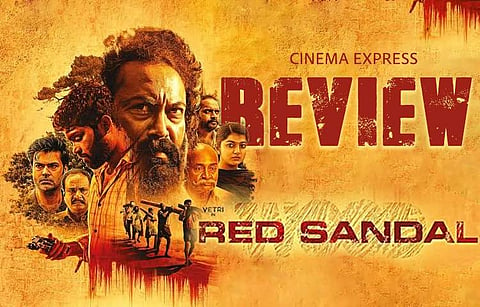Red Sandal Wood Movie Review: A promising premise let down by poor narrative choices
Rating:(1.5 / 5)
The first time we see MS Bhaskar in Vetri's Red Sandal Wood, the film is one-third complete. Of course, this reunion takes us back to Vetri's debut film, 8 Thottakkal. However, this feeling of Deja Vu lasts only for a few minutes as the veteran actor only plays an extended cameo, which only serves the purpose of milking sentiments and pathos. There are briefly exciting plot twists peppered throughout Red Sandal Wood, which are eventually undermined by an equally slow and rushed screenplay. Confused? I’ll explain.
Director: Guru Ramaanujam
Cast: Vetri, KGF-fame Ram, Ganesh Venkatraman, MS Bhaskar
So, Red Sandal Wood starts with an animation video that illustrates the importance the titular wood has in our Tamil culture. It explains how our traditional Marapachi dolls are made of that wood to ensure children are not just safe while playing with it but also gain medicinal benefits. With countries across the world wanting to get their hands on the said wood, it becomes profitable to smuggle the same, and it is against this backdrop that the narrative of Red Sandal Wood unfolds.
We then meet Prabha (Vetri), who is going to Tirupathi in search of his friend Karuna (Kabali-fame Vishwanath). Through a small flashback (something the film has in abundance), we understand that Karuna is inadvertently caught in a red sandalwood smuggling racket, and Prabha is a boxer and aspiring police officer.
Coming back to the contradictory world of Red Sandal Wood, the film is precisely 93 minutes long. This should have been a positive, right? Unfortunately, the makers sacrifice world-building for the sake of runtime and resort to short and tragic flashbacks or just as a passing mention. For example, in the beginning, Prabha’s boxing coach very casually mentions something about Prabha preparing for his police exams. Due to the rushed way of establishing this aspect, we actually don’t realise he is an aspiring cop until very late into the film. In fact, we connect the dots after he seems too familiar with Civilian Information Report (CIR), police procedurals, and a lot more that a common person might not be aware of.
The central conflict of the film is how the greed of smuggler Harimaran (KGF-fame Ram) harms Tamil civilians, who are not just threatened into cutting and smuggling red sandalwood but also lose their lives to the Andhra Pradesh and Telangana Police. After entering this world to save Karuna, Prabha decides to put an end to Harimaran and his nefarious ways. Meanwhile, Prabha is accidentally imprisoned for smuggling and witnesses 6 of his fellow prisoners being killed by the cops. But the rushed narrative doesn't really work in establishing empathy, resulting in lines like “Tamil Naadu lerndhu pora kadaisi uyir endha dhaan irukanum” becoming meaningless, and just a clear attempt to milk sentiment from an unsuspecting audience.
Once Prabha decides to end the cruel reign of Harimaran by saying, “Un uyir edukama en uyir pogadhu da,” the film starts going in circles. After a stretched narrative, the film takes a convoluted way to reach the climactic portions that would have been better served with a straightforward conclusion. The second half of the film loses itself to long stretches of action sequences, and a very predictable good-winning-over-evil ending. But even then, the film could have been salvaged if the makers chose any other ending rather than the one they finally decided to go with.
After Prabha succeeds in his mission (obviously he did, he’s the hero), we assume the film’s credits will start rolling. That would have been a rather perfect ending, as the runtime would have also come up to a crisp 90 minutes. Instead, the director chooses to go with three more minutes of melancholy and tragedy as we see a montage of people who were slain by the cops with regard to the smuggling issue. As the makers zoom out of these bodies to the credits that read ‘a film by Guru Ramaanujam’ I was left perplexed with that choice. Neither was I moved by the melancholy nor was I satisfied with the commercial-ness of it.
Looks like Vetri has a thing for unintentionally bilingual films. His previous film, Bumper was a Malayalam-Tamil bilingual set in Sabarimala. Red Sandal Wood is a Telugu-Tamil bilingual, with almost 50 per cent of the dialogues in Telugu. In fact, Ganesh Venkatraman, a prominent character, fully speaks in Telugu, a rather undermining factor although there are Tamil subtitles running throughout.
Red Sandal Wood tries to convey a message about Sandalwood smuggling and the naive humans who end up becoming victims of the trafficking. Instead, it tries to instigate political differences between Tamil Nadu and the Telugu-speaking states of Telangana and Andhra Pradesh. While the execution of the film is quite interesting, its rushed yet slow screenplay makes it a rather tiring watch.

